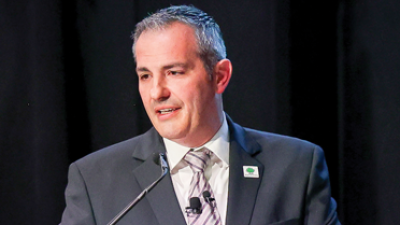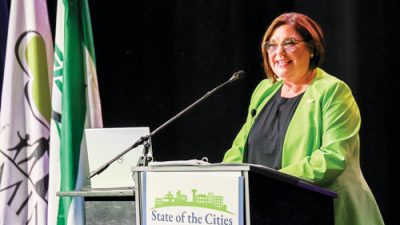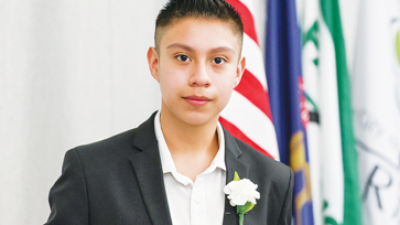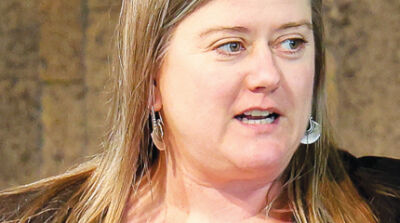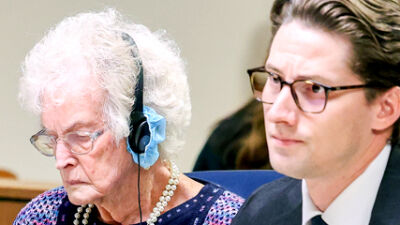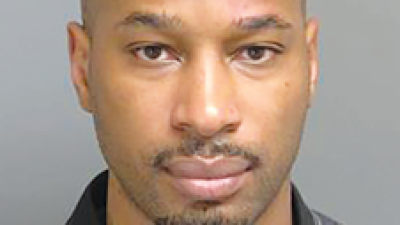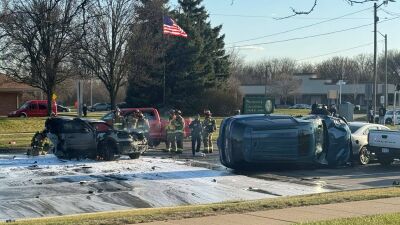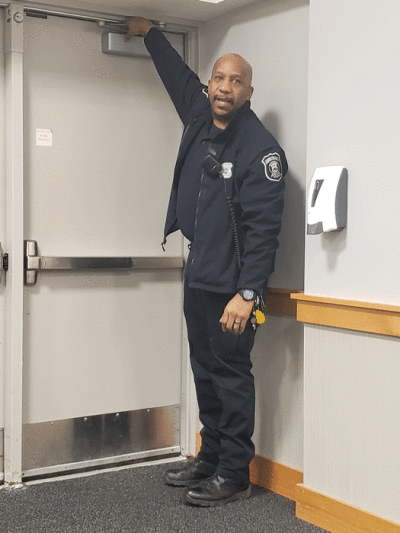
Farmington Hills Police Detective and School Resource Officer Kevin Clark points out the door hinges on the side door during a community dialogue session at the Maxfield Education Center Jan. 26. A sleeve can be placed over the hinge to prevent the door from opening in the event of a threat. Classrooms have been equipped with these sleeves, which teachers and taller students can place in the event of an emergency.
Photo by Charity Meier
FARMINGTON — As school shootings and bomb threats have become an ever-present reality in America, the Farmington Public Schools Board of Education held an open meeting Jan. 26 with members of the community to discuss school safety at the Maxfield Education Center.
Don Walker, the head of the board’s Community Engagement Committee, said the event was designed to give people an opportunity to engage in dialogue with the board to talk about issues that are important to the district.
“We want to engage with you. We want to talk with you. We want to hear from you,” said Walker. “We want to always do it from a place that’s positive intent. We have to learn to do that if we’re ever going to get to where we want to be.”
The event was put on by the committee and was hosted by David Dulio, the director of the Center for Civic Engagement and a professor of political science at Oakland University. Since the center’s founding in 2018, Dulio said, the intent of the center has been to make OU known for convening conversations on topics of public importance.
“One of the things that led me to launch the center was a realization that Americans can’t seem to be able to talk to each other without disagreement turning into hatred or one side turning into one side thinking the other side is evil. I think that is a bad thing for our nation, and I think that is a bad thing for our society,” said Dulio. “So at OU, what we try to do is do what we can around that. Civility — being able to talk to each other, being able to disagree without hating the other person, as simple as that may seem — is one of the threads that runs through what we do.”
Dulio pointed out that everyone in the room wanted the same thing: a quality education for children in a safe environment. However, he said that conversations often “go off the rails” when people discuss how to achieve that. So he instructed participants to focus on the fact that everybody wants the same thing.
Participants were separated into four tables of approximately eight people, including a school board member, and then were given a thought-provoking question on the issue of school safety. They then engaged in conversations on that question for about a half hour before being given a second question.
During the group conversations, a member kept a record of the discussion. Following the group discussions, some of the essential thoughts that came out of each conversation were brought to the forefront and discussed with all participants.
Several possible safety additions came up, such as night locks, that teachers could use to lock themselves and their students in the classroom in the event of a threat.
“What I’m looking for as a parent is how is my kid going to stay safe in this class,” said Lacey Harris, a parent and a mental health therapist. “Like, is the teacher going to have to throw the bookshelf? I wish I didn’t have to think like this, but I don’t think that there is anything that’s going to be an absolute. Whether it is a security or prevention strategies, I don’t think there is going to eliminate the possibility (of a shooting), but as a parent, I would like to see something. I would like to see something. I would like the possibility that there is reinforcement or some space that (kids) can feel safe. Even if it is not perfect.”
Some parents brought up the possibility of implementing metal detectors.
However, that might have a lot of negative impacts, according to Farmington Police Chief Jeff King.
King said metal detectors cause a “bottleneck” situation, where the kids are centralized in one location. He said that, often, those who are looking to cause harm at the school are seeking a situation where they can get the most kids at once, such as during lunch or recess. Metal detectors would give them another place to focus on as well.
“The high school I taught at had around 2,000 kids, and my husband was like, ‘Why don’t you just put in metal detectors?’ And I was like, do you know how long it takes to get 2,000 kids into a building? So just the logistics. If you go by a school during a fire drill, just look at how long it takes to get everybody back into the building after a fire drill. So it’s not a simple solution,” said Board of Education Vice President Claudia Heinrich.
School Resource Officer Kevin Clark said that they “write” on every threat that comes through. He said that means that every threat that occurs in the Farmington Public School District is reported to the Oakland County Prosecutor’s Office.
“Yeah, that’s hard, but the word gets out faster than we could even put it out,” said Clark. “Sheriff (Michael) Bouchard has put out a public service announcement in which he has made it very clear that Oakland County is not going to tolerate these nuisance threats. We have kids who put up these threats just to try and get out of school because they didn’t study for their test. It’s ridiculous, and it’s not going to be tolerated.”
Superintendent Christopher Delgado said that he has expelled three students this school year alone for school threats.
“We are using the full extent of our positive culture handbook that we are not tolerating it, whether it is credible or not, and then law enforcement is refereeing everyone to juvenile court,” said Delgado.
Delgado said they are communicating with students that this will happen.
A parent pointed out that they need to put things in very concrete terms when addressing the children.
“I think a phrase like, ‘We won’t tolerate it,’ is very different than, ‘You are going to have legal prosecution, and it will affect the rest of your life,’” the parent said.
Delgado said he thoroughly explains everything. Clark said they are talking about having conversations in smaller sizes rather than in the auditoriums, so kids can focus more, such as in a classroom setting. He said they are planning on doing that next fall.
King said that he has implemented a policy that, if a student makes a threat, that student will be visited by three police officers in their home right away.
“We walk a very fine line with what’s called the Constitution, and we have to obey that, but we push it as far as we can in the effort of the safety of our community and our children,” said King. “It’s probably 99% they’re young people doing young things that are ignorant and foolish. I’m not worried about that. I’m worried about the person that is preparing and trying to hurt someone. So we go out there and we check on things.”
Walker said the meeting was productive and gave the committee plenty of information to discuss at its next meeting. He said the CEC plans to hold a meeting in March and again in May to continue discussions on topics that are important to the district and the community.
“I think we started to build trust and build lines of communication,” said Walker. “As we become more aware about certain sections of things, the communities’ opinions about things, we want to work on what we can work on. As people engage and share, we can get a better temperature of what our community wants and needs. It’s relationship building at its fullest.”
Walker said the information gathered from the meeting will be posted on the district’s website. The next community dialog meeting will be 6:30-8:30 p.m. March 14, and the topic will be “social emotional learning and impacts on class.” Walker said this will include a discussion on cellphones in the classroom.
 Publication select ▼
Publication select ▼


